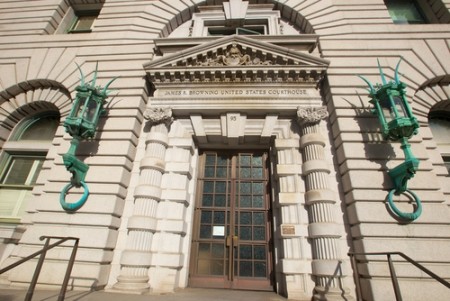9th Circuit rejects government's argument that Trump's sanctuary cities order was mere bluster

The San Francisco-based 9th U.S. Circuit Court of Appeals/CSNafzger (Shutterstock.com).
A federal appeals court has ruled that President Donald Trump’s order to withhold federal grants from sanctuary cities and jurisdictions violates separation of powers principles that gave spending power to Congress.
The San Francisco-based 9th U.S. Circuit Court of Appeals ruled 2-1 on Wednesday that the city and county of San Francisco and the county of Santa Clara were entitled to an injunction. But the court vacated a nationwide injunction because of insufficient evidence about the impact beyond the Bay Area city and counties.
On remand, the appeals court said, the trial court should conduct “a more searching inquiry into whether this case justifies the breadth of the injunction imposed.”
Trump’s executive order says the attorney general and the Department of Homeland Security should ensure that federal grants are withheld from jurisdictions that refuse to share immigration information with the federal government.
Chief Judge Sidney Thomas wrote the majority opinion finding the order to be unconstitutional. “Absent congressional authorization, the administration may not redistribute or withhold properly appropriated funds to effectuate its own policy goals,” he wrote.
Dissenting Judge Ferdinand Fernandez said that, in “a rush to litigate,” the plaintiffs challenged the executive order before the case was ripe for review. Fernandez noted that the executive order directed the withholding of funds in a way that is “consistent with the law.”
As a result, the order doesn’t require illegal action, and it’s improper to issue an injunction “on the unsupported speculation that it will be implemented in an unconstitutional manner,” Fernandez said.
The administration itself had argued that the executive order had no impact, according to the majority.
“On the merits, the administration argues that the executive order is all bluster and no bite, representing a perfectly legitimate use of the presidential ‘bully pulpit,’ without any real meaning,” Thomas wrote in the majority opinion.
But the majority didn’t read the executive order that way. Thomas’ opinion noted the order excluded grants for law enforcement purposes from being withheld, with the implication that all other grant programs should be cut. The majority also said the savings clause—requiring the order to be interpreted “consistent with the law”— can’t override clear and specific language in the order.
The administration’s position “is grounded not in the text of the executive order but in a desire to avoid legal consequences,” Thomas wrote.
The case is San Francisco v. Trump. The Los Angeles Times and the Washington Post have coverage.
Related article:
ABAJournal.com: “Judge permanently blocks Trump’s sanctuary cities order, while Sessions announces point-based grants”
See also:
ABAJournal.com: “7th Circuit limits national ‘sanctuary cities’ injunction to Chicago”



